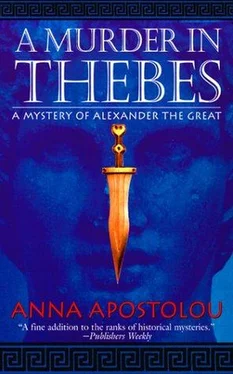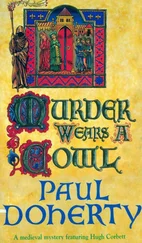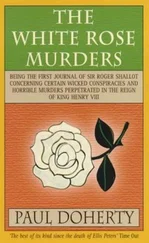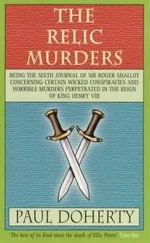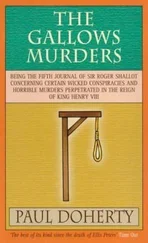Paul Doherty - A Murder in Thebes
Здесь есть возможность читать онлайн «Paul Doherty - A Murder in Thebes» весь текст электронной книги совершенно бесплатно (целиком полную версию без сокращений). В некоторых случаях можно слушать аудио, скачать через торрент в формате fb2 и присутствует краткое содержание. Год выпуска: 2013, ISBN: 2013, Издательство: Headline, Жанр: Исторический детектив, на английском языке. Описание произведения, (предисловие) а так же отзывы посетителей доступны на портале библиотеки ЛибКат.
- Название:A Murder in Thebes
- Автор:
- Издательство:Headline
- Жанр:
- Год:2013
- ISBN:9780755395736
- Рейтинг книги:4 / 5. Голосов: 1
-
Избранное:Добавить в избранное
- Отзывы:
-
Ваша оценка:
- 80
- 1
- 2
- 3
- 4
- 5
A Murder in Thebes: краткое содержание, описание и аннотация
Предлагаем к чтению аннотацию, описание, краткое содержание или предисловие (зависит от того, что написал сам автор книги «A Murder in Thebes»). Если вы не нашли необходимую информацию о книге — напишите в комментариях, мы постараемся отыскать её.
A Murder in Thebes — читать онлайн бесплатно полную книгу (весь текст) целиком
Ниже представлен текст книги, разбитый по страницам. Система сохранения места последней прочитанной страницы, позволяет с удобством читать онлайн бесплатно книгу «A Murder in Thebes», без необходимости каждый раз заново искать на чём Вы остановились. Поставьте закладку, и сможете в любой момент перейти на страницу, на которой закончили чтение.
Интервал:
Закладка:
“But the Macedonians destroyed your city?” Miriam asked.
“Not our city,” they both chorused.
“What are your names?”
“Memnon called us Castor and Pollux. We asked him why, and he just laughed. We thought he liked bum boys.”
“And?”
“Then we heard one of the serving wenches squealing in his chamber. But you can’t say the same about the rest.”
“His officers?” Miriam queried.
“Bum boys the lot of them,” the elder one said.
“You are?”
“Castor.”
“What do you mean they are bum boys?”
“By Apollo’s cock,” Pollux retorted, using a soldier’s favorite oath, “they were always clinging to each other in the stables or in their chambers. Demetrius and Alcibiades, Melitus and Patroclus. If they were dogs you’d throw a bucket of water over them.”
“They were lovers?”
“We didn’t say that,” Castor declared, his eyes fixed on the coins. “They just like each other’s bottoms.”
Miriam hid a smile. Sodomy amongst the Macedonian soldiers was common; many of them were bisexual. In her youth she had been shocked, but now she glanced away; if the truth were known, she really didn’t care about Macedon or its army. Alexander was different.
“And Cleon?” she asked.
“Oh, he was fair enough Memnon’s man. He protected his captain like an old woman would her solitary chicken.”
“And the night Memnon died?”
“No one knew about it,” Castor replied. “Not till first light and the poor bugger’s body was found at the foot of the tower. I think Patroclus was on guard. Cleon was furious. They had a meeting here in the hall, Patroclus swore he heard nothing from the captain’s chamber.”
“Why do think Memnon died?” Miriam asked.
“He was lonely,” Castor replied. “He thought there was a traitor among his officers. It was common gossip. To be blunt, mistress, everyone was terrified! They thought the Thebans were going to attack, break in, and crucify us as they did poor Lysander.”
Miriam pushed two coins down the table.
“And do you know who the traitor was?”
“It couldn’t have been Cleon or Memnon.”
“Why is that?” Miriam asked the younger one.
“One night Cleon was in his captain’s chamber. I came up with some wine and a bowl of fruit. There were voices raised.”
“And what was said?”
“Cleon was talking to his captain. He agreed there was a traitor in the garrison. Cleon was terrified that this traitor would open the gates and allow the Thebans in. He was begging Memnon to double the guard, which the captain did. Anyone who went near the gate at night would have had an arrow in his gullet. And then Cleon said ‘If they break in, sir, you’ll not let them take me alive? You’ll kill me won’t you?’ Memnon scoffed, but Cleon insisted. I paused on the stairway. I love hearing conversations. Cleon asked Memnon if he had his suspicions about who was the traitor? Memnon said. ‘Whoever it is must be an archer, that’s right!’ Cleon asked why. Memnon replied that he had been on top of the tower late one night and had seen a fire arrow shot from the yard below. It went across the palisade. I thought I had heard enough,” he stammered, “so I brought in the wine.”
“But you left hurriedly?” Miriam asked.
“They closed the door,” the page replied cheekily.
“But you listened at the keyhole?”
“Memnon begged Cleon to discover who the spy was. Cleon agreed, though he said something strange. . ” The page looked at the small pile of coins near Miriam’s elbow. She pushed two across the table.
“Go on,” she said.
“Cleon said that if the assassin struck, he’d strike at Memnon. Cleon thought that the Thebans hoped Memnon would join Lysander; they then would have killed the two principal officers, and the garrison would have surrendered. Memnon agreed. Cleon told him to bar and bolt the door and to stay well armed. ‘They’ll try to kill you here,’ Cleon warned. Memnon pointed to that bloody dog he kept.”
“Where is he now?” Miriam interrupted.
“Oh, he’s been taken into the camp by that other bum boy, the one with dyed hair.”
“Ah, Hecaetus.”
“Yes, that’s right, Hecaetus. Anyway Memnon pointed at that great bloody mastiff and said he would take care of any assassin.”
“What else do you know?”
Both boys shrugged.
Pollux looked toward the window, where the light was beginning to fade.
“We’ll be going now.”
“Where?” Miriam asked.
“Back to the camp; that’s where the best food and wine are kept.”
The pages pushed back the bench, grabbed the coins, and scampered out.
Miriam sat until she heard their voices fade. She sighed and, taking her writing satchel, walked out into the corridor. Now that darkness was falling, she realized what a gloomy, somber place the citadel was. She put her hand out and felt the cold granite walls. It wouldn’t remain long. When Alexander left, this place would be destroyed. She took a pitch torch from its bracket and climbed the steep, spiral staircase. The tower seemed deserted, a ghostly hollow place. She paused on the stairwell and peeked into the chambers. The doors were open, the rooms were ransacked. She went farther up. The door to Memnon’s chamber was ajar; she pushed it open and went in. The air smelled stale-of dog, oil lamp, sweat, and leather. She placed the torch in a holder, and groping in the darkness, found some oil lamps, which she lit.
The shutters were closed. Miriam went to open them but felt a cold draft seeping through the cracks and decided to leave it. She opened the satchel and took out Memnon’s papers; she undid the cord and laid them on the table. In the light of an oil lamp, she began to leaf through the greasy, well-thumbed pieces of papyrus. In her time she had helped Simeon with army records, and these were no different. Typical soldiers’ entries, the writing crude and large. Stores, provisions, arms, a rough drawing of the Cadmea, a votive prayer to Apollo, drafts of orders. She found a copy of a letter Memnon must have intended for his son. Apparently written during the early days of his command of the Cadmea, the letter depicted Memnon as a jovial, bluff man, proud of Alexander’s trust in him, full of advice on how his son was to act. The letter, however, had never been sent. The scribbles of graffiti on the bottom half of the page were interesting. Probably done during the last days of his life, Memnon had written out promises: he would travel to this shrine or that, make votive offerings to the gods if he was safely brought through the present dangers. One phrase, however, was repeated: the name Oedipus , or the literal translation of the ancient Theban king’s name, swollen foot. “I have seen him tonight,” Memnon had scrawled. “I have heard him on the stairs, his club rattling against the wall.”
Miriam went cold. What had Memnon been talking about? The ghost of Oedipus? The accursed king of Thebes dragging himself through this ancient citadel? She continued reading, the same entry was repeated time and again. She found another dirty piece of parchment with the same remarks beneath a crude drawing of Oedipus carrying his club. Miriam raised her head. The citadel was very quiet now. She stared round the chamber.
Was Memnon’s shade here, she wondered? Did the old captain stand in the shadows and peer out at her? Or had he gone to Hades? She grasped her torch and went out to the stairwell. She heard a door close and turned around but there was no other sound. She went up the steps and passed the small garret, its door flung back; she peered in: nothing but a dusty cubicle. She climbed on. The staircase became narrower and led to a wooden door. Miriam raised the latch, and a buffet of cold air made her torch splutter. She went out onto the top of the tower, her feet crunching on gravel deliberately strewn there so that no one could miss their footing. The wind was strong, and Miriam shielded her face. She walked to the edge and stood with one hand resting on the crenellations. She lifted the torch and gazed down. It was now pitch dark. Yet she was aware of the dizzying height. Fires still burned in the city, and beyond, she could see the lights of the Macedonian camp. Memnon must have stood here when he’d seen the fire arrow loosed into the night sky. She once again stared at the ruins of Thebes and repressed a shiver. This was truly a necropolis, a city of the dead. She heard a sound; a group of soldiers were leaving, their torches mere pinpricks of light. Behind her the door to the tower clattered and banged. Miriam went back and, carefully closing the door behind her, went down the steps. She reentered Memnon’s chamber, and her stomach pitched. Someone had been here. The oil lamps had been moved. Her hand went to her girdle and she realized she had brought no weapon. But surely the garrison? Men were still here? She hurried to the chest at the foot of the little truckle bed and opened it. It smelled of stale sweat. She fumbled through the contents and sighed with relief as her fingers clutched a dagger. She pulled this out, threw away the battered sheath, and went to the door.
Читать дальшеИнтервал:
Закладка:
Похожие книги на «A Murder in Thebes»
Представляем Вашему вниманию похожие книги на «A Murder in Thebes» списком для выбора. Мы отобрали схожую по названию и смыслу литературу в надежде предоставить читателям больше вариантов отыскать новые, интересные, ещё непрочитанные произведения.
Обсуждение, отзывы о книге «A Murder in Thebes» и просто собственные мнения читателей. Оставьте ваши комментарии, напишите, что Вы думаете о произведении, его смысле или главных героях. Укажите что конкретно понравилось, а что нет, и почему Вы так считаете.
